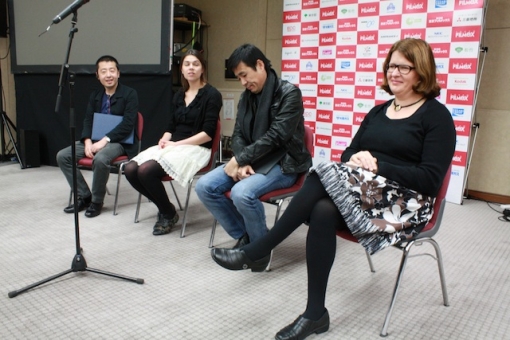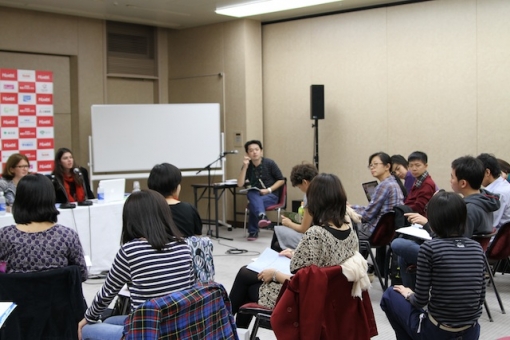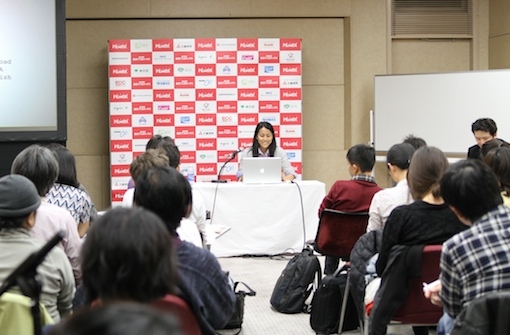Participants in the Tokyo Talent Campus at the FILMeX Film Festival. Photo by Ian Wang
Funding is a dreaded problem for all filmmakers. But especially for first-timers, gaining the trust of investors (unless one wishes to be condemned to credit card debt-hell), is a particularly daunting endeavor.
Acknowledging funding as an arduous hurdle for independent Asian filmmakers, organizers of the Tokyo FILMeX film festival established a Talent Campus -- modeled after the Talent Campus at the Berlin Film Festival -- with the aim of providing a platform for filmmakers to share, discuss, and present their projects to film industry professionals with the goal of securing funds. The inaugural Tokyo Talent Campus featured 15 participants -- chosen after an application process -- hailing from Thailand, Malaysia, the Philippines, Japan, China, Hong Kong, Indonesia, Singapore, as well as a few based in the US (but with origins in Asia).

Photo by Talent Campus Tokyo 2011
Aside from attending a week full of lectures led by directors, producers, and other members of the film industry (which included Chinese dir. Jia Zhangke, Japanese dir. Hirozaku Kore’eda, Korean producer Park Kiyong, manager of the Berlinale Talent Campus, and sales agents from European distributors), the participants worked individually to prepare a 5-minute presentation of his/her current project in the form of a “one-pager” (which lists project synopsis, director's statement, bio, and proposed budget) to be given at a public pitch-session, the key event of the Talent Campus. While 5 minutes is definitely too short to fully articulate the thoughts behind a feature film project, I was still impressed by the diversity of the stories presented, which demonstrated a group of very astute, globally-oriented filmmakers whose inspirations come from events both close and far away.

Photo by Talent Campus Tokyo 2011
This year’s documentary proposals especially leaned toward showing how personal lives are altered by different forms of globalized developments. Examples include Vorakorn Ruetaivanichkul’s Everybody’s Here, which explores the dynamics of his own family’s recovery from bankruptcy and his mother’s failed suicide attempt and Beyond the Wave by Kyoko Miyage, a critical look at how people of her hometown Namie confronts the Fukushima nuclear disaster and the town’s own history with nuclear power. These projects are all deeply personal and show filmmakers’ courage to explore usually unspeakable family traumas in contemporary Asia. When it came to fictional narratives, the scopes were equally wide-ranging, and truly reflected an international focus. Sci-fi inspired Karmapolice is about an astronaut from Thailand who happens to be a crime-solving monk; while O.L., a road trip film by SF State grad Atsuko Hirayanagi, takes place both in Tokyo and the American West; and then you have the controversial Boy In The White by Afiq Deen, which is about the sexual discovery of a 12 year old boy growing up under gay parents in a strict Malaysian Islamic community.
When asked by audience members on why their projects all aim to be international co-productions, the answers were threefold: First, this is the reality in Asia today, where people and cultures are becoming increasingly mingled through commerce, tourism and political exchanges. Secondly, co-productions expand a story's marketing appeal -- for example, a Thai film featuring a Japanese star, or vice versa, can cross over a multitude commercial territories not available to single-origin films. Finally, it is an issue of pragmatism and insurance: given the uncertain economic situations in many countries, pooling multiple funding sources is simply a necessity.
After describing their stories, each participant endured the anxiety and awkwardness of finally asking for money. It’s embarrassing enough asking friends for a few dollars, try telling a roomful of strangers than you need $100,000 for a documentary or $1 million for a feature. Here, everything about a project comes under the most intense scrutiny. From the participants’ performances, I got a sense that nerves and idealism played conflicting roles, and as a result, the amount of money asked by most of the projects seemed unrealistic given the stage of development they were in. But at the same time, being honest about one’s need for money is exactly the stumbling block every filmmaker has to overcome, and thankfully, this pitch session at the Tokyo Talent Campus was not a do-or-die event meant to make or break dreams.

Photo by Talent Campus Tokyo 2011
Whether anyone succeeds in getting funding for his/her project is another matter, but this Talent Campus served as a great launching pad and a practice run for many more pitching sessions to come for these young filmmakers. The week-long experience created a very tight bond between all the participants and their mentors. Sometimes, it’s not the money but the networking that matters, and in this respect all the participants gained something very valuable. In the end, the Talent Campus awarded a 300,000 yen (about $4000 dollars) grant to Shan Zuolong’s Chinese silk industry documentary Songs of Mulberries, as his was the only one currently in the post-production phase and thus the grant would secure the delivery of a finished piece.
Having observed the pain and exhilaration from these young filmmakers and their stories, I can take away one piece of advice for independent -- especially Asian American -- filmmakers trying to fund their features in this globalized world (whether we like it or not): Think outside of the border.
Below is a list of funding opportunities for filmmakers whose stories take them to Asia and beyond:
Hong Asian Film Financing Forum









Comments